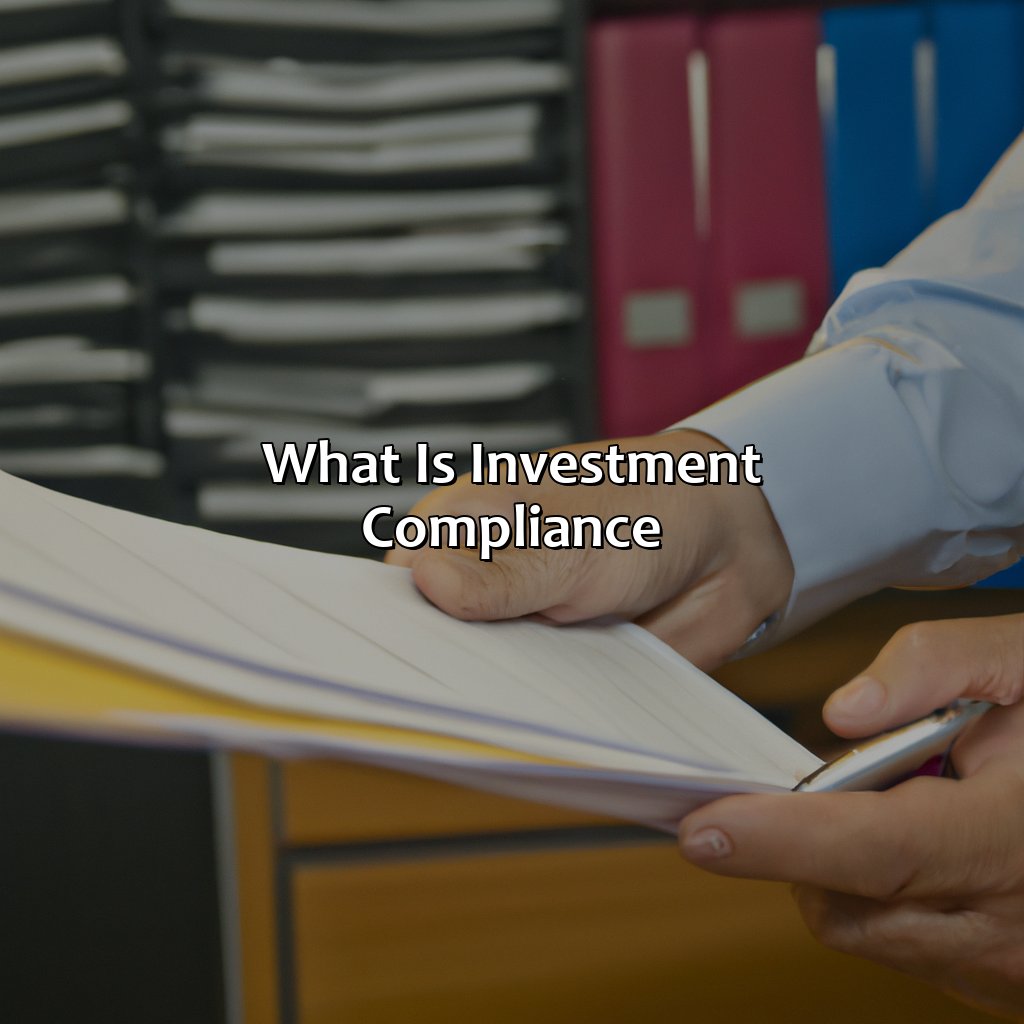What Is Investment Compliance?
Key Takeaway:
- Investment compliance refers to the adherence of laws, regulations, and internal policies and procedures that govern the investment industry. It ensures that investments are made ethically, responsibly, and with due diligence.
- Investment compliance is important to protect investors, maintain market stability, and ensure fair competition among investment firms. It also helps to prevent fraud, money laundering, and other financial crimes.
- The investment compliance framework includes policies and procedures, regulatory compliance, and reporting and monitoring. Investment firms must have a robust compliance program and keep up-to-date with changes in regulations and laws.
Are you confused about investment compliance? Learn what it is and why it is important for managing your investments, so you can make financially sound decisions. You deserve to have knowledge of the rules and regulations of investing.
Definition of Investment Compliance
Investment compliance involves ensuring that financial institutions comply with regulatory requirements and adhere to industry codes of conduct. It focuses on protecting investors and ensuring that the investment industry operates with integrity. This includes monitoring and reporting requirements, risk assessments, due diligence, and internal controls. Investment compliance is crucial for maintaining trust in the financial system and preventing misconduct and fraud. Investment firms often have dedicated compliance teams responsible for implementing and enforcing compliance policies and procedures. Such teams work with regulators to ensure firms are complying with various regulatory requirements and providing transparency to investors. Failure to comply with investment regulations can result in significant financial penalties and reputational damage for firms. For this reason, investment compliance is a vital component of the financial industry.
In addition to regulatory compliance, investment firms also need to consider ethical and social responsibility considerations. These firms play a significant role in shaping the financial landscape and the wider society in which they operate. Therefore, they need to follow ethical principles and consider the potential social and environmental impact of their investments. Ethical considerations can include avoiding investments in companies that are known to engage in human rights abuses, environmental destruction, or other unethical practices. Ensuring compliance with ethical standards can help firms to enhance their reputation and build trust with investors and stakeholders.
A prominent example of the importance of investment compliance is the Wells Fargo scandal. The bank was fined $185 million for creating millions of fake accounts in customers’ names without their knowledge or consent. The scandal led to a loss of trust in the bank, significant financial penalties, and the resignation of its CEO. This example shows how non-compliance with investment regulations can lead to disastrous consequences for firms. It highlights the need for investment firms to take compliance seriously and implement robust compliance policies and procedures to prevent misconduct and protect investors.
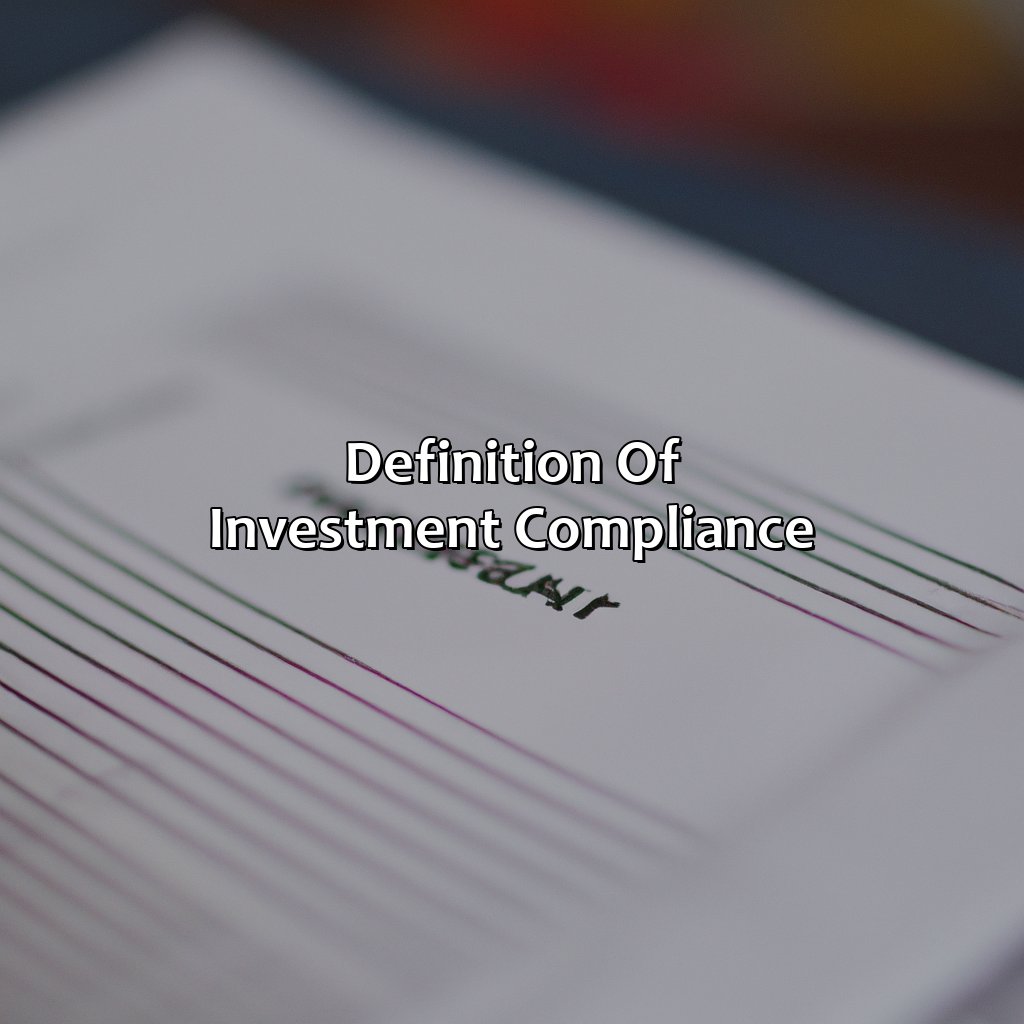
Image credits: retiregenz.com by Harry Jones
Why is investment compliance important?
Investment compliance is crucial for safeguarding investments, ensuring adherence to legal and ethical standards, and maintaining the integrity of financial markets. Failure to comply may result in severe consequences, including financial loss, reputational damage, regulatory sanctions, and legal action. Compliance serves as a framework for effective risk management, identifying potential hazards and mitigating them. Compliance requires constant monitoring, updating policies, and integrating new regulations. Without investment compliance, investors face a higher risk of losing their investments and causing harm to markets and the public.
Investment compliance ensures that investment firms operate in accordance with regulations, including KYC, AML, and GDPR. Compliance also involves monitoring and reporting suspicious activities and transactions, preventing fraud, and providing accurate and timely disclosures to investors. Compliance risks can arise from various sources, including human error, technological vulnerabilities, and external factors, such as changes in regulations or market conditions. Effective compliance requires a holistic approach, involving multiple stakeholders, including investors, regulators, and compliance professionals.
Effective investment compliance not only reduces risks but also promotes transparency, accountability, and ethical behavior. It enhances investor confidence, attracts new investors, and builds a good reputation for investment firms. Investment compliance is no longer an option for firms but a necessity. It is important to ensure that compliance requirements are met, while staying updated with new regulations, technologies, and market trends.
A leading investment firm once faced severe fines and reputational damage due to non-compliance with regulatory requirements. They had failed to monitor and report suspicious transactions properly. The firm suffered significant losses as a result of lost investors and business. The negative impact on the firm’s reputation has lasted for years. The firm learned the hard way that investment compliance is an essential aspect of operating in today’s financial markets.
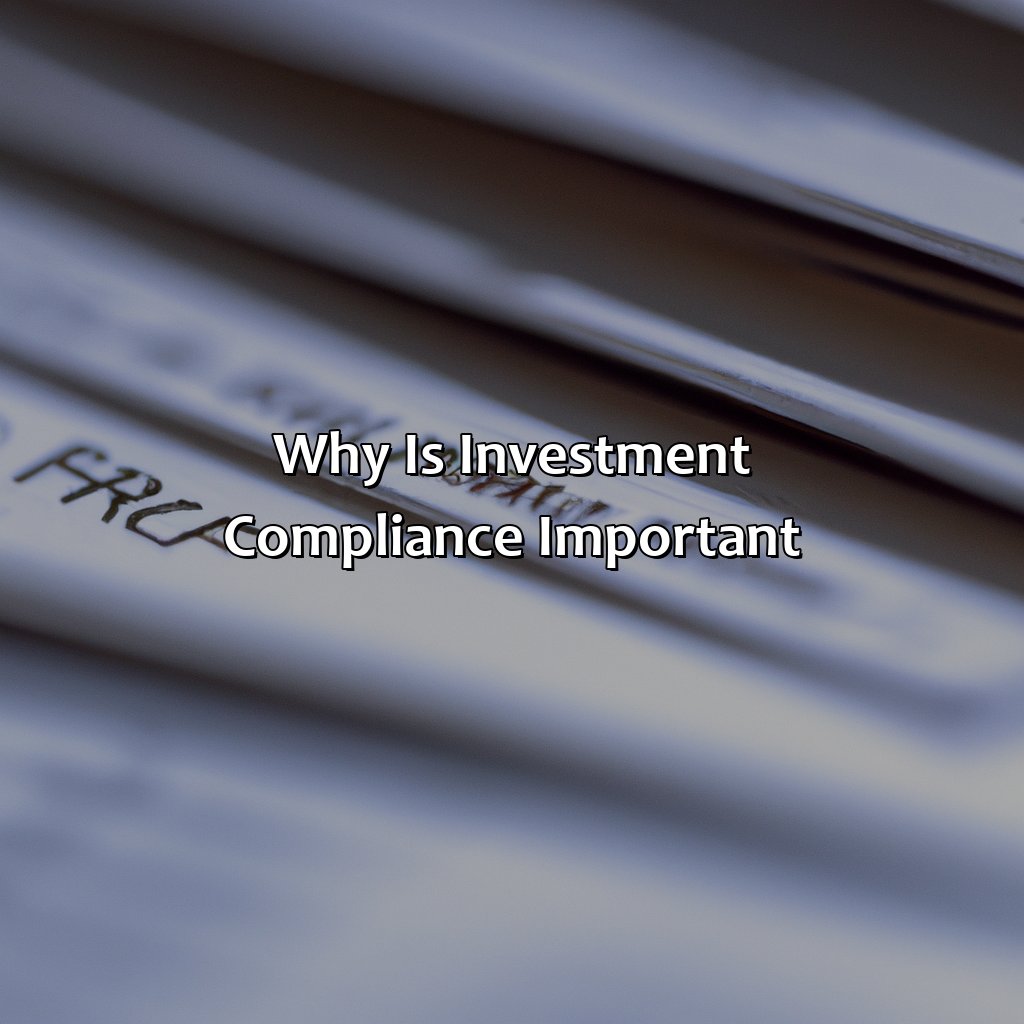
Image credits: retiregenz.com by Yuval Duncun
Investment Compliance Framework
To ensure investments are ethically and legally sound, the Investment Compliance Framework provides an all-encompassing solution. It has four sub-sections:
- Policies and Procedures
- Regulatory Compliance
- Reporting
- Monitoring
These sub-sections create a strong framework and watch over investors to make sure laws and regulations are followed.
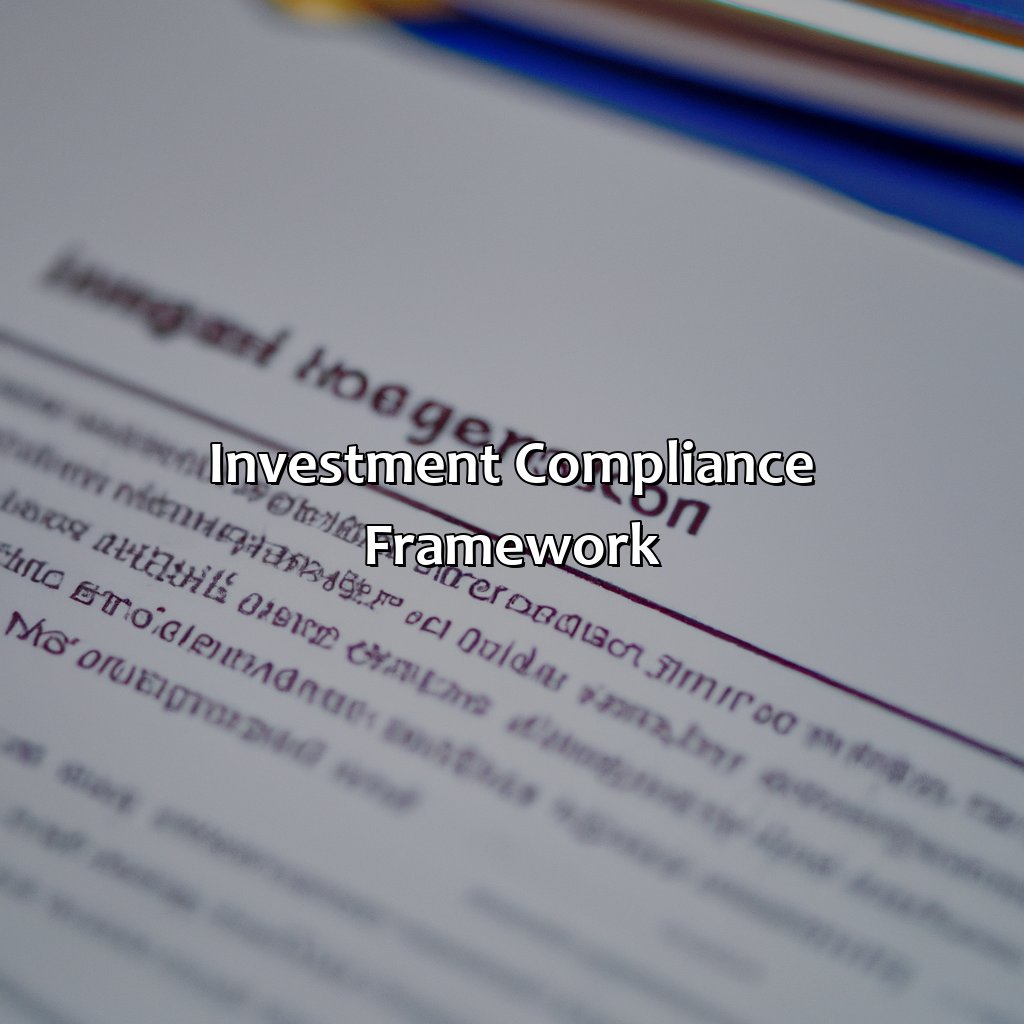
Image credits: retiregenz.com by Harry Washington
Policies and procedures
Investment Compliance Framework requires well-structured protocols and regulations to execute operations effectively. These policies and procedures act as the backbone of compliance. They ensure that investments abide by locally set rules and regulations, maintain ethical standards, observe market practices, and avoid high risks.
Compliance policies correspond to industry best practices that help establish operational consistency in documentation, reviewing mechanisms, and reporting requirements. Procedures are a series of sequential tasks that outline distinct processes within compliance policies with specific roles and responsibilities defined for each stage.
It is critical to enforce clear compliance policies and procedures to prevent operational disruption or financial loss due to any misconduct. Any breaches or deviations need to be investigated immediately, corrective actions identified and remedied.
In one particular instance, an investment firm failed to conduct adequate due diligence on the counterparty it was dealing with, resulting in fraud losses suffered by their clients. The regulator found out about this incident during an audit leading to enforcement action against the firm for failing to comply with local regulatory requirements. This situation would have been entirely avoidable if clear compliance protocols were enforced concerning counterparty due diligence.
Compliance with regulations may be boring, but it’s better than the alternative of being fined and publicly shamed.
Regulatory Compliance
The concept of adhering to Regulatory Compliance is vital in the investment industry. It involves complying with legal and ethical guidelines, policies and standards established by regulatory bodies. To ensure stakeholders’ interests are protected, compliance monitoring programs are adopted and frequent audits conducted.
Proactive adherence to these guidelines ensures that investors are safeguarded against fraudulent activities while preserving their rights. Investment businesses have stringent regulatory compliance requirements to maintain their operating licenses/transparency obligations, such as providing client reports to regulatory authorities.
Investment firms must adhere to strict and constantly changing laws related to money laundering, privacy breaches, conflicts of interest and insider trading. These regulations vary by geographic location; hence investment firms have a need for global standardization through various trade organizations.
According to Forbes, non-compliance cases in January 2021 alone led to fines of $22 billion globally; it’s crucial for firms be well-informed about updated regulations and adhere to them stringently.
Reporting and monitoring – where investment compliance meets Big Brother, but without the drama of being stuck in a house with strangers.
Reporting and Monitoring
For Investment Compliance Framework, Reporting and Monitoring is vital.
- Regular reporting on investments status to ensure compliance with regulation and in-house policies.
- Monitoring of investment activities to manage the risks arising due to non-compliance with rules.
- Creating customized monitoring reports as per the specific requirements of clients and investors.
- Analyzing data to identify patterns and provide insights for better decision-making in investment compliance.
Apart from these points, it’s crucial to continuously update and improve reporting and monitoring processes for efficient outcomes.
Investment firms cannot ignore the importance of Reporting and Monitoring in Investment Compliance Framework. To ensure that investors’ trust remains intact, it’s essential to stay abreast of industry changes, regulatory updates, and technological advancements. Adopting best practices will also help firms maintain a competitive edge in the market. Start investing in quality Reporting and Monitoring now and seize opportunities without any fear of missing out!
Skip investment compliance at your own risk – It’s like driving without seatbelts, you may get away with it for a while but eventually, you will regret it.
Benefits of investment compliance
Investment compliance is crucial for successful investments. It is important to consider the benefits of ensuring investment compliance.
- Minimizes Compliance Risks: Investment compliance helps to minimize the risks of non-compliance, legal penalties, and reputational damage.
- Enhances Trust: It builds trust with customers and stakeholders when investments are managed in compliance with regulatory requirements and ethical standards.
- Increases Efficiency: Compliance procedures streamline investment processes, reduce operational costs, and ensure investments meet with legal and ethical standards.
- Improves Investment Outcomes: Compliance increases the likelihood of investment success and strengthens investor confidence in the ability of investment managers.
Investment compliance not only helps to meet regulatory requirements but also enhances investor confidence, trust, and investment efficiency. According to the Securities and Exchange Commission, “Investment managers who comply with laws, rules, and regulations demonstrate to their clients, prospects, and regulators a commitment to integrity, ethics, and professionalism.”
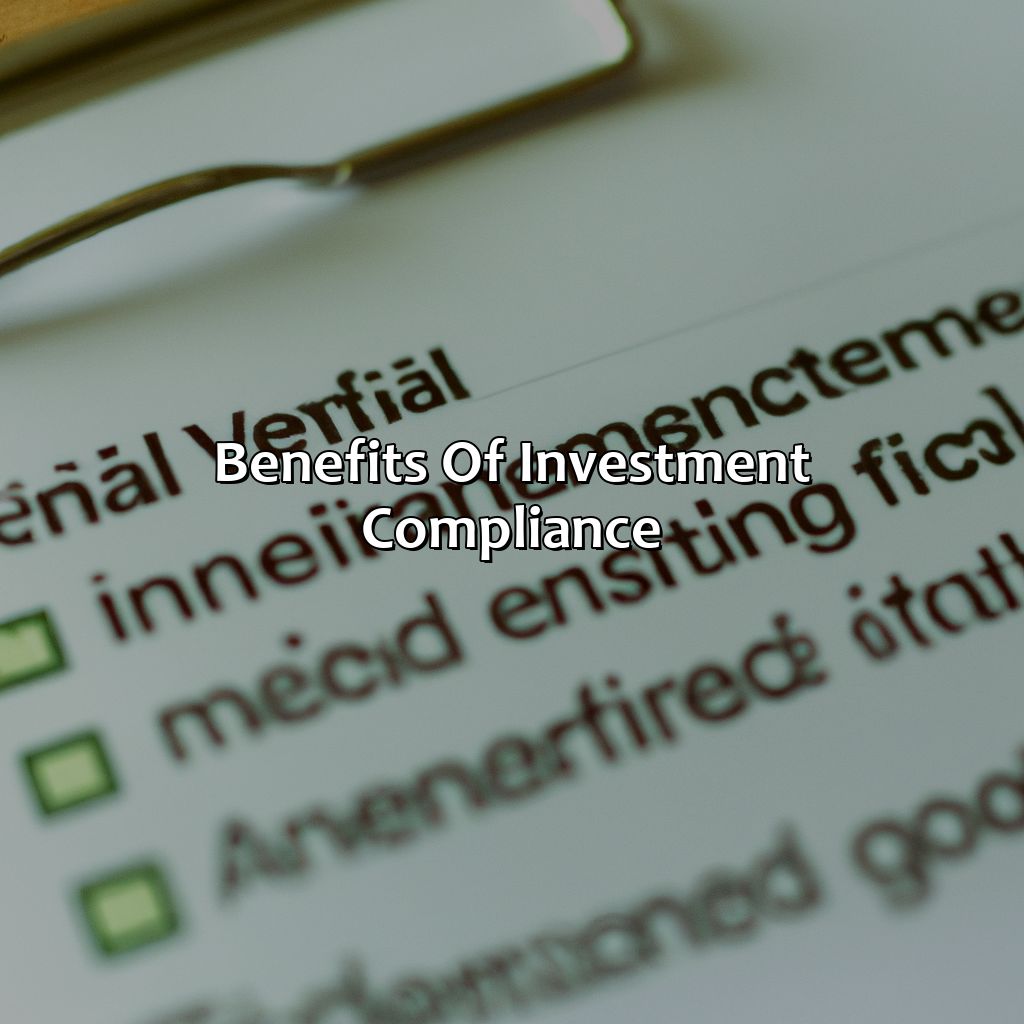
Image credits: retiregenz.com by Joel Woodhock
Challenges in Investment Compliance
Investment Compliance can be challenging due to various factors. One such challenge is the lack of clarity in regulations and guidelines. This can result in conflicting interpretations and applications. Another challenge is the difficulty in keeping up with the constantly evolving regulatory landscape, making it tedious to adjust compliance practices accordingly. Additionally, managing data for compliance purposes can be arduous given the expanse and complexity of data in investments.
To overcome these challenges, investment firms can implement automated compliance solutions to ensure regulatory adherence. Such solutions can provide real-time monitoring and alerts to pre-empt issues before they escalate. Additionally, investment firms can prioritize training and education to keep abreast with changing regulatory requirements and promote a culture of compliance. Furthermore, standardization of data and use of advanced analytics can enable efficient and accurate management of compliance data.
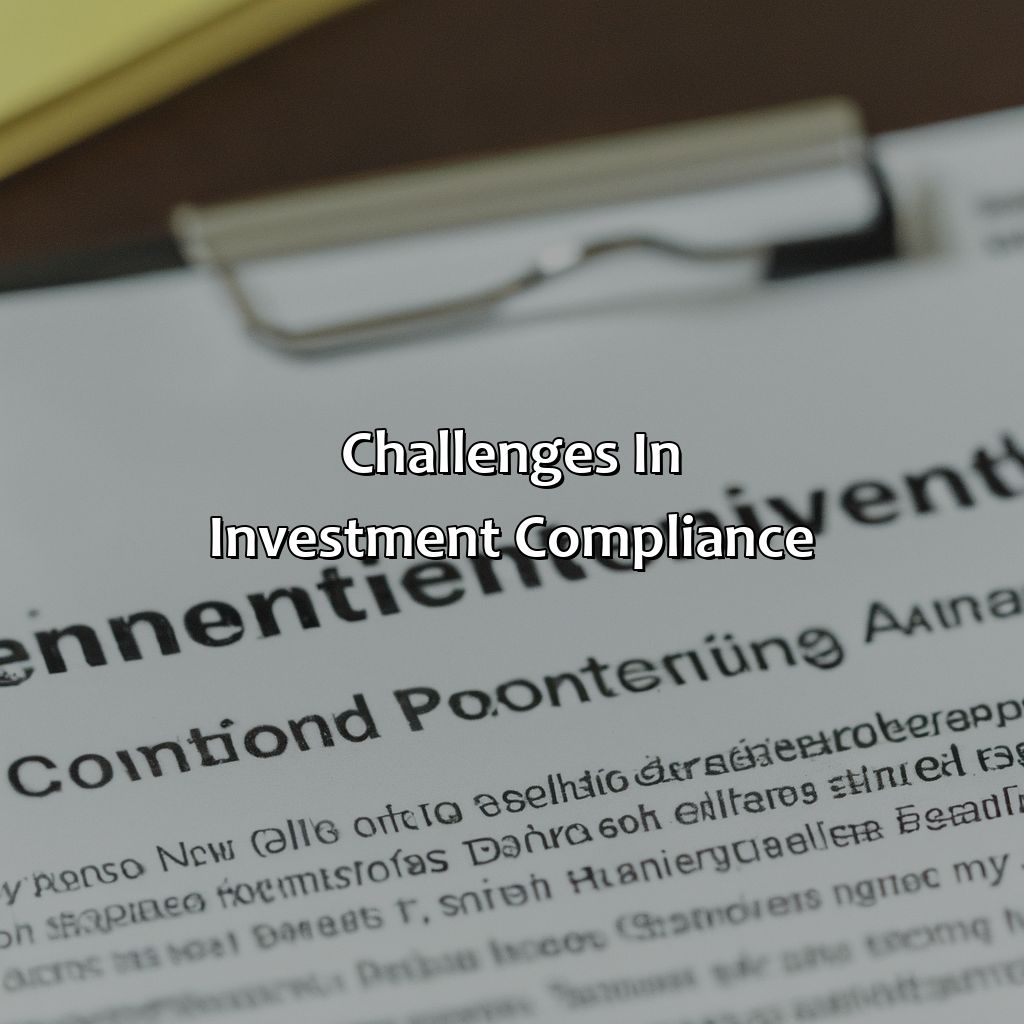
Image credits: retiregenz.com by James Jones
Some Facts About Investment Compliance:
- ✅ Investment compliance refers to the adherence to regulatory guidelines and laws in the management of investment portfolios and financial services. (Source: Investopedia)
- ✅ The main objective of investment compliance is to ensure that investors’ interests are protected and that ethical standards are maintained in the financial industry. (Source: CFA Institute)
- ✅ The Securities and Exchange Commission (SEC) is the main regulatory body responsible for enforcing investment compliance regulations in the United States. (Source: SEC)
- ✅ Investment compliance covers a wide range of areas, including risk management, portfolio diversification, anti-money laundering, and cybersecurity. (Source: Thomson Reuters)
- ✅ Failure to comply with investment regulations can result in severe legal and financial consequences, including fines, lawsuits, and reputational damage. (Source: Forbes)
FAQs about What Is Investment Compliance?
What is investment compliance?
Investment compliance is the process by which investment firms and professionals adhere to the rules and regulations set forth by regulatory bodies. This ensures that all investments are made ethically and in the best interests of clients.
Why is investment compliance important?
Investment compliance is crucial in protecting investors and maintaining the integrity of financial markets. Failure to comply with regulations can result in legal and financial penalties for investment firms and professionals.
What are some examples of investment compliance regulations?
Examples of investment compliance regulations include anti-money laundering laws, fiduciary duty requirements, insider trading restrictions, and disclosure requirements.
Who is responsible for investment compliance?
Investment compliance is the responsibility of investment firms and professionals. This includes compliance officers who are responsible for ensuring that the firm and its employees adhere to all applicable regulations.
What are the consequences of non-compliance with investment regulations?
The consequences of non-compliance with investment regulations can include fines, legal action, loss of license or registration, and damage to the reputation of the investment firm or professional.
How can investors ensure that their investments are in compliance with regulations?
Investors can ensure that their investments are in compliance with regulations by working with investment firms and professionals who are compliant with all applicable regulations. They can also educate themselves on investment compliance regulations so they can make informed investment decisions.
